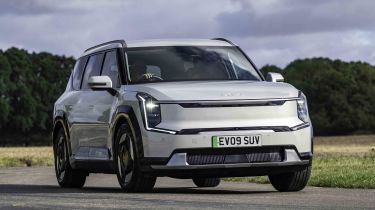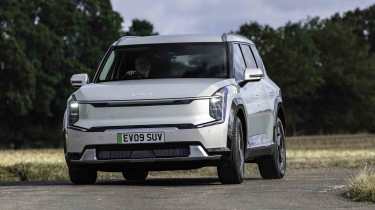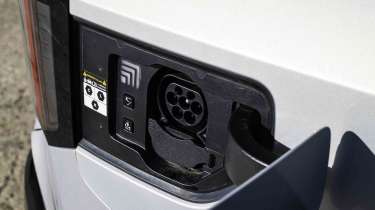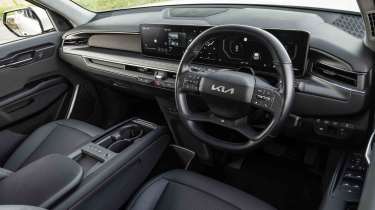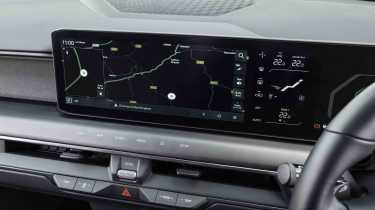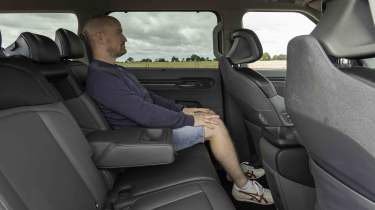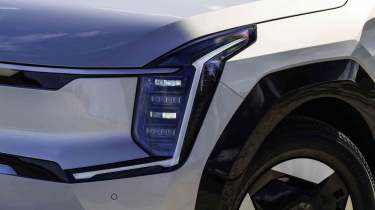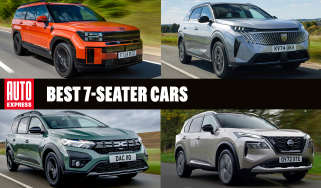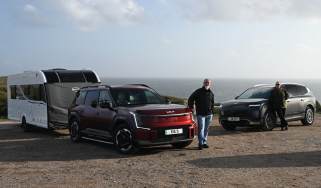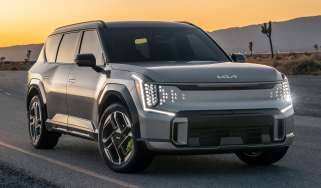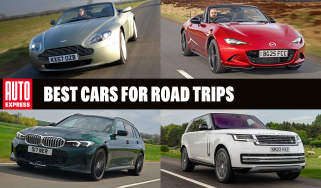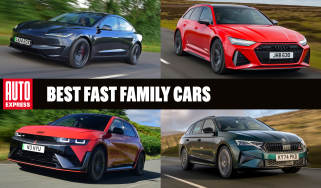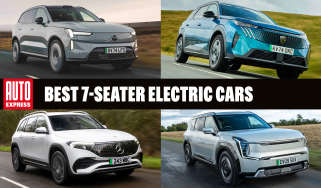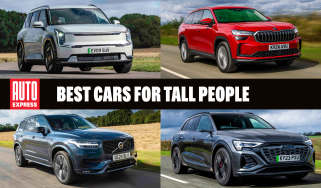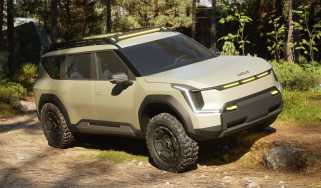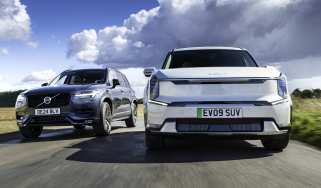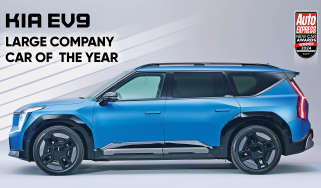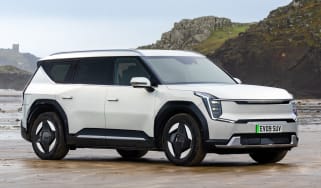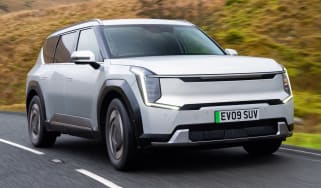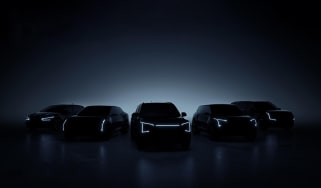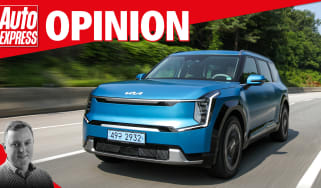Kia EV9 review
The enormous Kia EV9 packs electric power into a highly practical seven-seat package

Our opinion on the Kia EV9
The Kia EV9 is not only one of the most practical cars in the current Kia range (offering up seating for either six or seven people), but it also happens to be one of the most expensive models the Korean brand has ever sold in the UK. However, you do get what you pay for.
A large battery delivers a long range, while fast charging recovers energy at a rapid rate. There’s plenty of room for adults across all three rows, while the fit and finish befit the car’s price. All versions are well-equipped, too, from the entry-level Air to the luxurious GT-Line S. There are a few minor issues with the EV9, but they’re not big enough to stop it from being on your shortlist if you’re looking for a premium family SUV.
About the Kia EV9
Kia has offered buyers a seven-seater for decades. Following on from the Sedona MPV, there was the slightly more compact Carens, and then the firm aimed to add some desirability with the first Kia Sorento. That nameplate has carried the seven-seat option for the brand since, but it’s the Kia EV9 that moves that onto a fully electric powertrain.
The entire EV9 line-up comprises a whopping 99.8kWh battery (96kWh of which is usable), providing up to 349 miles of driving range. You can also choose from either a rear-drive single motor set-up or dual-motor four-wheel drive.
Kia EV9 prices and latest deals
The Kia EV9 isn’t a cheap car, regardless of your chosen trim level, with the official price bracket ranging from around £65,000 to £83,200. However, we have good news if you buy via our Auto Express Buy a Car service, as we offer an average saving of £6,074.
Alternatively, there are also a number of reasonably priced used Kia EV9s to choose from, and these start from under £48,000. If you’d prefer to lease your new car, you can find Kia EV9 deals starting from around £725 per month. You can also sell your existing car for a great price with Auto Express Sell My Car.
Performance & driving experience
|
Pros |
|
|
Cons |
|
Customers can choose from three all-electric powertrain options for the Kia EV9, all of which benefit from a 99.8 kWh battery. Beyond that, the choice boils down to whether you need maximum efficiency with rear-wheel drive, the additional traction of four-wheel drive, or something that’ll scare the kids on the school run in the form of the four-wheel drive GT.
Big, comfortable and relaxing are words that spring to mind when driving the EV9. Less expected is a surprising amount of ability from the chassis, and levels of refinement that give many premium offerings something to think about.
The EV9 comes with five brake regeneration levels, ranging from complete freewheeling to one-pedal driving. The latter setting means the car can bring itself to a complete stop without the driver needing to touch the brake pedal at all.
| Model | Power | 0-62mph | Top speed |
| Air 99.8kWh single motor | 200bhp | 9.4s | 114mph |
| GT-Line 99.8kWh AWD | 378bhp | 5.3s | 124mph |
| GT 99.8kWh AWD | 501bhp | 4.6s | 136mph |
Performance, 0-60mph acceleration and top speed
The 200bhp, single-motor, rear-wheel-drive Air model is the slowest EV9, taking 9.4 seconds to reach 0-62mph and topping out at 114mph. It’s got enough grunt with one on board, but we’d like just a little more shove so it feels a bit more effortless.
The dual-motor version puts out 378bhp, accelerates from 0 to 62mph in 5.3 seconds and has a top speed of 124mph – all despite weighing more than 2.6 tonnes. It doesn’t hold back in terms of performance. In typical electric car fashion, its huge reserves of power and torque are available right from the off.
But if you want something even faster that’ll give a Volkswagen Golf R a fright, you’ll need the EV9 GT. Like the Kia EV6 GT, the EV9 GT is the quickest model in the EV9 range, with 501bhp on tap, helping to cut down the 0-62mph time to 4.6 seconds. It adopts some of the technology from the Hyundai Ioniq 5 N, namely its virtual gear shift system, which mimics the sensation of changing gear using the paddles behind the steering wheel. It also uses the car's speaker system to provide the sound of a V6 engine.
Town driving, visibility and parking
One consequence of the huge wheelbase is the 12.4-metre turning circle, which means it’s not the easiest car to manoeuvre in tight spots. Many more premium rivals offer four-wheel steering, and that feature would be welcome here.
There are one or two other small niggles that only really present themselves at low speeds. One is the throttle pedal, which can be a little tricky to modulate at parking speeds. The other can be felt over broken surfaces, where the EV9’s suspension can come across as just slightly brittle.
Country road driving and handling
Those small gripes about the ride and the turning circle have a flipside at higher speeds, where the Kia’s ride comfort is excellent. There’s a soft, languid response over bumps that means occupants don’t get thrown around. Thanks to so much of the car’s mass being located in the floor-mounted battery pack, it feels superbly stable and has a very neutral balance front to rear.
So while the EV9’s size means it won’t be pushed anywhere near its limits often, it feels really impressively balanced and poised for a car of these dimensions, which is reassuring on those rare occasions that you might need to make an emergency manoeuvre. Nicely weighted and precise steering helps here, too.
Motorway driving and long-distance comfort
The suspension feels wonderful on a motorway, and it’s here that the EV9 really gets into its stride. Road and wind noise is well contained, and stability is excellent.
All versions come with adaptive cruise control with a stop-and-go function that’ll be quite helpful in reducing the stress of holiday traffic. A lane centering assistance feature is also standard and takes some of the effort out of long-distance trips, although you will still need to keep your hands on the wheel and pay attention to the road at all times because this is not a self-driving feature.
“Even within our test team, there’s a difference of opinion when it comes to how to do regenerative braking, so the fact that Kia gives drivers the choice is welcome.” – Alex Ingram, chief reviewer.
Range, charging & running costs
|
Pros |
|
|
Cons |
|
While some regions see the Kia EV9 offered with a smaller 76.1kWh battery, the UK just gets the larger 99.8kWh pack, There’s a usable capacity of 96kWh as standard, which is one of the bigger packs available on the market – the Volvo EX90 has a 111kWh battery, but it costs over £15k more.
Even better, the EV9 features a heat pump as standard, so less battery power is required in cold weather to keep the cabin warm. Owners can also sync their car to their smartphone via Kia’s dedicated app, enabling heating or defrosting the windows while it is still plugged into the mains. This means you won’t waste battery power heating the car up, and ultimately help to preserve the driving range.
| Model | Battery size | Range | Insurance group |
| Air |
99.8kWh (96kWh useable) | 349 | 45 |
| GT-Line (seven-seat) |
99.8kWh (96kWh useable) | 313 | 50 |
| GT-Line S (six-seat) |
99.8kWh (96kWh useable) | 315 | 50 |
Electric range, battery life and charge time
The claimed range for the entry-level Air model is up to 349 miles, and we averaged 3.2 miles/kWh on test and 2.7mi/kWh in colder conditions, translating to 270-320 miles of real-world range. While that’s slightly less than the WLTP figures, it means that even in winter, it’ll be more than good enough for longer journeys.
Adding four-wheel drive reduces the range of the GT-Line version to 316 miles, while the bigger 21-inch wheels of the GT-Line S drop this even further to 313 miles. The EV9 GT has the least range, with only 280 miles between charges.
If you do need to top up on the go, finding a rapid charger that’ll keep up with the Kia’s potential will be the hardest part. Once it’s plugged into a rapid-charging point that can reach at least 210kW, then it will take just 24 minutes to replenish the battery from 10-80 per cent. Using a 7.4kW wallbox charger at home will take over 15 hours, so plan your charging accordingly.
Insurance groups
Group ratings are high for the EV9. Despite its modest performance, even the base Air model is in Group 45, while the twin-motor GT-Line and GT-Line S models are all in Group 50. Insurance figures haven’t been released for the GT model, but we expect that to also be in group 50.
In comparison, the equally electric Hyundai Ioniq 9 starts in group 42.
Tax
As of April 2025, the Kia EV9 (along with many other EVs) no longer benefits from temptingly low tax rates. While first Vehicle Excise Duty (VED) road tax of £10 is still pretty good, owners will get a nasty surprise in year two, when not only are they subject to the same £195 per year as combustion equivalents, the Kia’s £40k+ price tag means a surcharge for the next five years too – lifting the total tax bill to £620 per annum in years two to six of registration.
Thankfully, things are a little lower for company users. While the Benefit in Kind (BiK) company car tax rate has gone up from two per cent to three per cent for the 2025/2026 tax year, that’s still far less than the double-digit percentage rates you’d pay for a petrol or diesel alternative, meaning BiK savings of thousands of pounds per year.
Depreciation
Holding on to around 51 to 53 per cent of its value after three years means that the EV9 fares similarly to the Volvo EX90, which is predicted to be worth between 51 to 55 per cent over the same period. Combustion-powered seven-seaters also see similar figures, although the Land Rover Discovery performs slightly better than the Kia by maintaining between 55 to 61 per cent. However, there’s no company car tax-friendly plug-in hybrid version of the Land Rover that’s capable of driving on electric power alone, which might offset any savings with its superior residual values.
Interior, design & technology
|
Pros |
|
|
Cons |
|
The EV9’s cabin isn’t quite as eye-catching as some recent Kias, but it’s more than fit for purpose, with a priority on space, storage and usability. Kia’s infotainment systems aren’t the most advanced you’ll find in modern cars, but they’re generally among the better options for usability, and the same is true here. At the EV9’s price, some of the materials could be better, but we suspect few serial Kia buyers will complain about what’s otherwise a contemporary and quite luxurious space.
Interior and dashboard design
The wide, low dash gives the cabin a very contemporary look, while the chunky, square steering wheel spokes and the physical toggles for the climate controls manage to look modern, yet remain intuitive to use.
You might be confused by the starter button’s position on the column-mounted gear selector stalk at first, but it makes perfect sense to put it there once you’ve found it.
Although the cabin is loaded with tech, not all of it is perfect. One irritation is the climate control touch panel. This sits between the two 12.3-inch displays on the dash, but is almost completely obscured by the steering wheel from the driver’s seat.
Fortunately, the row of physical toggle switches provides easy interior temperature adjustment. It’s a welcome addition that many rivals could learn from as they opt to embed such controls in the infotainment system menus to save costs.
We’re not so blown away by the touch-sensitive panel beneath the infotainment screen; it’s needed for jumping around between key functions on the system, but it requires a surprisingly hefty prod to register an input. Adding to the display count is the electric rear-view mirror, which is standard on every model. For those who would rather use a conventional mirror, it can be switched off.
Materials and build quality
Kia’s fit and finish improve with every generation of cars it releases. While it’s more than good enough to compete with the best mainstream offerings, it’s still not quite on a level with the premium brands yet. While everything feels fairly well screwed together, the materials in something like a Land Rover Discovery or Volvo XC90 feel plusher, and the switchgear feels more sturdy.
The buttons for heated and ventilated seats, plus the heated steering wheel, are on the door. Initially, it may seem a bit odd, but you’ll get used to it.
Infotainment, sat-nav and stereo
The EV9 features a 12.3-inch touchscreen navigation, which comes with seven years of free Kia Connect Services. As ever with Kia, the infotainment system keeps things simple; it’s not the fanciest to look at, but it’s clearly laid out and intuitive to use. However, while that’s absolutely fine at the mainstream end of the market, the tech does begin to feel a little less impressive at this price point. Kia’s touch-sensitive shortcuts sit on a panel below the screen to make the system easy to work out.
Wireless phone charging comes as standard, along with Apple CarPlay and Android Auto smartphone connectivity and an eight-speaker sound system. The richer-sounding 14-speaker Meridian premium sound system comes with GT-Line S and GT trims, along with a head-up display system that projects essential driving information – such as the speed you’re going – onto the windscreen within your line of sight.
“It’s annoying that the heated seats switch on to the coolest setting first. We think that’s counterintuitive because you put heated seats on due to being cold, so that becomes a needless three-button press faff.” – Max Adams, Online reviews editor.
Boot space & practicality
|
Pros |
|
|
Cons |
|
The Kia EV9 is a big car. For length and width, it’s almost on par with a Land Rover Defender 110, which means UK parking bays will feel a real squeeze - you’ll always have some of the car hanging out of the space, and getting in and out won’t be easy with cars parked next to you either.
If you can live with that, then the benefit of the EV9’s size is the space it offers inside, with the option of six or seven seats, a wide, open and spacious dashboard design, high seating position, and loads of interior storage. The rearmost seating row still isn’t entirely suited to adults, so this is no MPV replacement, but there are no such concerns with the middle row. Even with seven seats in place, there’s a decent boot that’s capable of handling the weekly shop. The EV9’s not beyond a bit of towing either, provided you opt for the all-wheel drive version.
Dimensions and size
| Dimensions comparison | |||
| Model | Kia EV9 | Hyundai Ioniq 9 | Volvo EX90 |
| Length | 5,010mm | 5,060mm | 5,037mm |
| Width | 1,980mm | 1,980mm | 1,964mm |
| Height | 1,755mm | 1,790mm | 1,747mm |
| Wheelbase | 3,100mm | 3,130mm | 2,985mm |
| Boot space | 333-2,318 litres | 338-2,494 litres | 310-1,915 litres |
At more than five metres long, the Kia EV9 is only beaten by limousines and pick-up trucks for length, while a width of 1,980mm without mirrors (only 28mm narrower than a Land Rover Defender; Kia doesn’t publish mirrors-out figures) means width restrictions need to be at least 6.5 feet wide for the EV9 to fit.
Seats & passenger space
A light, open feeling makes the EV9 seem very spacious from either of the front seats. There are loads of adjustments in both the driver’s seat and the steering wheel, which, combined with a fairly low dashboard line and a square bonnet means that it’s quite easy to judge the front corners for such a large car. There are also front, rear, and even side parking sensors to help you out, plus a 360-degree camera system should you need further assistance.
Storage is plentiful, too. The glovebox is huge, the slim door bins have enough space for a bottle, and a raised centre console includes a wireless smartphone charge pad and two covered stowage areas. The one under the centre console is quite shallow, because it makes room for a huge space below that’s accessible from the middle-row seats.
Buy an EV9, and there will be no excuses for you and your family not to stay hydrated, because there are no less than 12 cup-holders scattered around the cabin. Starting from the back, the third row occupants get two each; and there’s a further six in the middle row – two are at the rear edge of the front armrest, two in the centre fold-out armrest, and one on each door. Up front, there are another two; press a little button, and the spring-loaded holders appear within the front storage cubby.
Hop into the second row and the EV9 offers loads of headroom and a very wide cabin that, hard centre seat backrest aside, means it’s accommodating for three people. A completely flat floor and kneeroom that is above average among seven-seat SUVs make it a comfortable place to be, too.
The backrests for the middle row can recline, and the seats slide forward to make more room for those in the third row. Even when the middle row is slid all the way forward, there’s still a reasonable amount of space for adults. Passengers can choose their preferred temperature thanks to a climate-control panel and a pair of vents in the roof, plus there are heated and cooled outer middle-row seats, and a pair of retractable window blinds. Some EV9 trims are available with six seats, which swaps the centre bench for a pair of captain’s chairs.
An electric release tilts and slides the middle seats forward, but getting into the third row is still a slightly tight squeeze. Once there, kneeroom is a bit tight for taller adults, but headroom and elbow room are both good, and the backrests are electrically adjustable. Those in the third row also have two USB-C ports, and each seat has an ISOFIX mounting, for a total of four points across the second and third rows.
Boot space
At 333 litres, the EV9’s boot is close to that of most superminis, even when carrying seven people. But a space under the bonnet offers 52 litres in dual-motor models. A single-motor Air has 90 litres of load space up front – perfect for storing charging cables.
In five-seat mode (where the rear seats fold down electrically via buttons on the side of the boot wall), luggage space measures 828 litres. This expands to a van-like 2,318 litres in two-seat mode, and the area is square in shape and almost completely level.
Towing
As part of an exclusive EV towing test, we used an all-wheel drive Kia EV9 in GT-Line trim to tow a caravan from Bristol to Land's End in order to determine how this would impact the car’s real-world efficiency.
Unfortunately, the additional strain of towing had a significant impact, because our test car only managed to average 1.5 miles per kWh, which is the equivalent of around 150 miles of range to a full charge. The impact on the EV9’s refinement and performance was pretty minimal, though, which was particularly impressive.
Our main reason for using the four-wheel drive model is that the rear-wheel drive EV9 has a significantly reduced braked towing capacity of only 900kg as opposed to 2,500kg for the four-wheel drive model. The latter figure is matched by the BMW iX and four-wheel drive Hyundai Ioniq 9.
If you’re looking to tow more and still want something electrified, a BMW X5 xDrive50e can lug up to 2,700kg, while traditional petrol and diesel seven-seat SUVs like the Land Rover Discovery can pull up to 3,500kg.
“The whole rigmarole of parking up, unhitching, going to top up the battery and then hitching up again was tedious, and having to reconnect the caravan in the dark or rain was a recipe for things to go wrong.” – Dean Gibson, senior test editor.
Reliability & safety
|
Pros |
|
|
Cons |
|
Kia placed third in the 2024 Auto Express Driver Power owner satisfaction survey of brands, but it took quite a fall in the 2025 survey, all the way down to 16th out of 31 manufacturers.
The EV9 bagged a five-star Euro NCAP rating in 2023. An active bonnet system helps to mitigate injury risk for pedestrians, while a 360-degree camera system is standard on every model to help with low-speed driving.
Safety experts Euro NCAP awarded the Kia EV9 the maximum five-star rating when tested in 2023. Regarding similarly priced large electric SUVs tested around the same time, the Lexus RZ achieved better results in adult, child, and vulnerable road user protection, but the EV9 outperformed it in the safety assistance category.
The Kia EV9 comes stacked with safety technology as standards, such as autonomous emergency braking to help prevent or mitigate low-speed collisions with other vehicles and vulnerable road users in town. It also has a lane-keeping assist system to help keep you within your lane on the motorway and a driver monitoring system to let you know when to take a break. A traffic sign recognition system also lets you know important information, such as speed limits.
All EV9s come with blindspot monitoring to warn you of any cars that are alongside when you go to change lanes, plus a 360-degree camera system with front and rear parking sensors to help when parking. Both of those are handy for such a large car, and are welcome standard features – especially when many rivals (often more expensive ones) make you pay extra for such features.
All Kias get a seven-year warranty, and that puts the EV9 clear of all its premium SUV rivals, except Lexus, which offers up to 10 years’ cover. This is only valid if annual services are carried out at a main dealer for the duration. The 12 months of roadside assistance provided by Kia does feel a little stingy when plenty of manufacturers can cover up to three years.
EVs have far fewer moving parts than ICE cars, so there aren’t any regular oil or spark plug changes. Regenerative braking means discs and pads need less frequent attention, too. As a result, maintenance tends to be less expensive, which is why a three-year service plan for the EV9 comes to a reasonable £439 (as of 2025).
| Euro NCAP safety ratings | |
| Euro NCAP safety rating | Five stars (2023) |
| Adult occupant protection | 84% |
| Child occupant protection | 88% |
| Vulnerable road user protection | 76% |
| Safety assist | 83% |
Buying and owning
- Best buy: Kia EV9 Air 99.8kWh 200bhp RWD
Basic is best for the EV9. Yes, it’d be nice if the rear-wheel drive EV9 had just a little more performance in reserve, given the 200bhp rear-motor model has to work hard to overcome a kerb weight of well over two tonnes even with just a single passenger aboard. And it’s not the option if you want to do any towing either, as it’s rated for a braked trailer of only 900kg.
But at just over £65,000, you’re getting the best value EV9 in the range. The next model beyond this is just over £73,000, which is a bit too much of a jump in our opinion. At the more affordable end of the EV9's pricing structure, the fact that not all of the cabin feels up to the level of premium rivals doesn’t matter so much, nor that the Kia badge doesn’t have the kudos of its premium competitors.
The powertrain still does a pretty good job of motivating the EV9, and it’s always smooth and quiet. Compared with a diesel Kia Sorento - the kind of car that thousands of family buyers are already perfectly happy with (and some of whom may well be trading up to an EV9) - it doesn’t seem so bad. Likewise, the 349-mile range is better than the dual-motor EV9 can manage, which we suspect most buyers will find more useful than a quicker 0-62mph time that’ll trouble a 1990s supercar.
Kia EV9 alternatives
As it stands, EVs with seven seats are hard to track down. The main choice comes from converted vans such as the Citroen e-Berlingo and larger Spacetourer (as well as their Stellantis group alternatives) and the V-Class-based Mercedes EQV. Beyond that, there’s the Peugeot E-5008, but when it comes to outright space, it’s down to the Volkswagen ID. Buzz in long-wheelbase form and the very leftfield Maxus Mifa 9 as the viable alternatives.
The electric Volvo EX90 offers similar seven-seat versatility, but that is several orders of magnitude more expensive at over £82,000, this is because it’s aimed squarely at the luxury car market.Then there’s the cheaper Mercedes EQB, which also offers seven seats but is smaller and not as practical as the EV9. It doesn’t have the big Kia’s clever EV technology with super quick recharging times, either. A much closer contender is from sibling brand Hyundai. Kia did beat its group partner to the punch in building a true jumbo electric car, but the Hyundai Ioniq 9 enters the fray at slightly less money than the EV9, at just under £65,000.
Expand your search to include combustion engines and plug-in hybrids, and there’s more variety on offer. A mainstay of the class has been the Land Rover Discovery, while the company also offers the Defender with a similar boxy style to the Kia. It’s worth noting that the Discovery is diesel only, while the Defender has a selection of petrol, diesel and PHEV powertrains, as well as three body lengths to choose from, although the 110 and 130 versions are the ones to choose if you want passenger-carrying ability. Elsewhere, company car-friendly plug-in hybrids such as the Audi Q7, BMW X5, and Volvo XC90 are on offer, as are PHEV versions of the Kia Sorento and Hyundai Santa Fe.
Despite the van-like looks of the Volkswagen Multivan, it’s much better to drive than its van-based MPV rivals because it actually has more in common with the Volkswagen Passat under the skin. It’s available with a variety of seating configurations and can be had with plug-in hybrid, diesel, or petrol power.
Frequently Asked Questions
As with every new Kia, the EV9 has a seven-year/100,000-mile warranty. The drive battery is also covered by a 100,000-mile warranty, although it lasts for eight years. The warranty will cover any repairs that may be needed to ensure the battery has at least 70 per cent of its original capacity.
Deals on the EV9 and rivals

